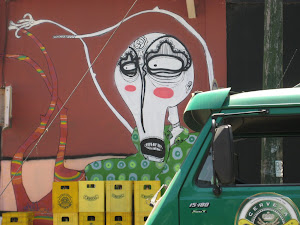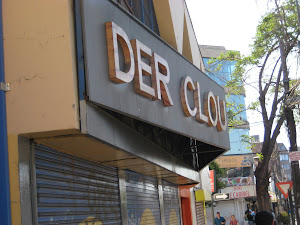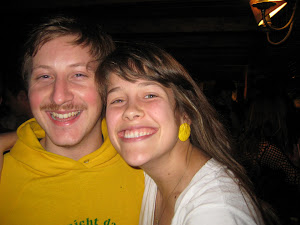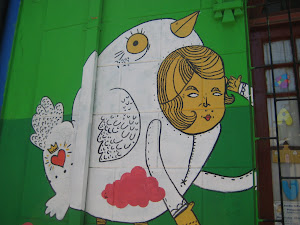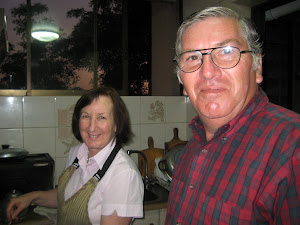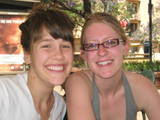So recently my Aunt Anne (another faithful reader) asked if in Cordoba we were also having a coin shortage like the one in Buenos Aires, mentioned in a New Yorker article.
The answer is yes! Almost everyday I am either told the vegetable guy owes me 15 cents for the next time, or the photocopy lady lets me get a few copies and pay back the 20 cents another time if I only have a 2 peso bill. Having a hundred (and I'm paid in 100s) can be like having nothing if you don't want to make a grocery store trip, cause most people would rather lose the business than part with their small bills. Granted, my "business" is usually a peso worth of candy, so it's an understandable decision. Today was the best though: I bought some spinach and cheese patties (just had one for lunch, EXCELLENT) for 7.50 and gave the guy a ten and two peso coins. To show his gratitude for the coins, not only did he give me back a 5 (thus only charging 7) but also threw in two calamari and cheese sticks. Awesome!
Tuesday, June 23, 2009
Tuesday, June 16, 2009
Fight! For the Right!
So, when faithful blog follower Joanie Howland asked why I hadn't written in a while, I told her that basically, although I am having lots of fun in Cordoba, it's fun of a very routine, ordinary variety and not very blog-worthy. However, there are a few things about my life in Cordoba that, although common, are still pretty interesting: protests! Here's a rundown of some of the recent incidents of civil unrest I have participated in, performed at or been inconvenienced by:
1. Festival of Solidarity for Iveco, April 24th, 2009. Iveco is a car parts company where many of the workers were fired in a supposed violation of their labor contract, and thus the entire body of workers went on strike. As is often the case, I was (and am) not completely clear on the details of the conflict: I know there are more than two sides to every story and some people tell it that the firings were a necessary, legal step to combat this oft-mentioned economic crisis we're all going through. I'm not sure, but I do know that the festival was in support of normal, working people who are currently unable to support their families, and if dancing with the murga made them feel even a little bit better, it's got to be worth something!



2. March for the 40th Anniversary of the Cordobazo, May 29th, 2009. The Cordobazo (on this same date in 1969) is the name for a giant, 36 hour strike of union workers and students in opposition to the dictatorship of Ongania and the limits said dictatorship was putting on the rights of students and workers. It turned into an armed conflict between the protestors and the police, tons of property was destroyed, hundreds of protestors arrested and twenty were killed. The spirit of the march, as far as I could tell, was in memory of the fallen, but also a call to repeat the Cordobazo; not so much the violence, but union of students and workers in a common cause, something that is sadly missing today, as evidenced by the 4, count'em, FOUR, different marches to commemorate the event.
3. City hall and bus driver strikes, Friday, June 12-? The city hall workers have been striking since Friday, in protest of a proposal to cut their salaries and limit their benefits. Here's a pic from the Argentine indymedia website (Giacomino, mentioned in the poster, is the mayor who wants to make the cuts): As a result,choripan (sausage sandwiches) stands have popped up everywhere (here's a nice shot of a typical choripan vendor):
As a result,choripan (sausage sandwiches) stands have popped up everywhere (here's a nice shot of a typical choripan vendor): their owners taking advantage of the lack of regulation, and things are generally a mess. Meanwhile, from Friday to midday Saturday all the buses of the province were on strike for a salary increase, impeding people from traveling for the long weekend and, more importantly, getting to work. The incredibly frustrating part of it all is that these two groups represent two of the most well-paid sectors of Cordoba, with salaries higher than teachers, accountants, and even doctors, to name a few. Even more frustrating, who does the bus strike inconvenience more than anyone? The little guy, of course. People with money have cars or can take taxis, but the less economically fortunate folks have no way to get to their jobs, where they are undoubtedly paid less than the bus drivers.
their owners taking advantage of the lack of regulation, and things are generally a mess. Meanwhile, from Friday to midday Saturday all the buses of the province were on strike for a salary increase, impeding people from traveling for the long weekend and, more importantly, getting to work. The incredibly frustrating part of it all is that these two groups represent two of the most well-paid sectors of Cordoba, with salaries higher than teachers, accountants, and even doctors, to name a few. Even more frustrating, who does the bus strike inconvenience more than anyone? The little guy, of course. People with money have cars or can take taxis, but the less economically fortunate folks have no way to get to their jobs, where they are undoubtedly paid less than the bus drivers.
1. Festival of Solidarity for Iveco, April 24th, 2009. Iveco is a car parts company where many of the workers were fired in a supposed violation of their labor contract, and thus the entire body of workers went on strike. As is often the case, I was (and am) not completely clear on the details of the conflict: I know there are more than two sides to every story and some people tell it that the firings were a necessary, legal step to combat this oft-mentioned economic crisis we're all going through. I'm not sure, but I do know that the festival was in support of normal, working people who are currently unable to support their families, and if dancing with the murga made them feel even a little bit better, it's got to be worth something!



2. March for the 40th Anniversary of the Cordobazo, May 29th, 2009. The Cordobazo (on this same date in 1969) is the name for a giant, 36 hour strike of union workers and students in opposition to the dictatorship of Ongania and the limits said dictatorship was putting on the rights of students and workers. It turned into an armed conflict between the protestors and the police, tons of property was destroyed, hundreds of protestors arrested and twenty were killed. The spirit of the march, as far as I could tell, was in memory of the fallen, but also a call to repeat the Cordobazo; not so much the violence, but union of students and workers in a common cause, something that is sadly missing today, as evidenced by the 4, count'em, FOUR, different marches to commemorate the event.
3. City hall and bus driver strikes, Friday, June 12-? The city hall workers have been striking since Friday, in protest of a proposal to cut their salaries and limit their benefits. Here's a pic from the Argentine indymedia website (Giacomino, mentioned in the poster, is the mayor who wants to make the cuts):
 As a result,choripan (sausage sandwiches) stands have popped up everywhere (here's a nice shot of a typical choripan vendor):
As a result,choripan (sausage sandwiches) stands have popped up everywhere (here's a nice shot of a typical choripan vendor): their owners taking advantage of the lack of regulation, and things are generally a mess. Meanwhile, from Friday to midday Saturday all the buses of the province were on strike for a salary increase, impeding people from traveling for the long weekend and, more importantly, getting to work. The incredibly frustrating part of it all is that these two groups represent two of the most well-paid sectors of Cordoba, with salaries higher than teachers, accountants, and even doctors, to name a few. Even more frustrating, who does the bus strike inconvenience more than anyone? The little guy, of course. People with money have cars or can take taxis, but the less economically fortunate folks have no way to get to their jobs, where they are undoubtedly paid less than the bus drivers.
their owners taking advantage of the lack of regulation, and things are generally a mess. Meanwhile, from Friday to midday Saturday all the buses of the province were on strike for a salary increase, impeding people from traveling for the long weekend and, more importantly, getting to work. The incredibly frustrating part of it all is that these two groups represent two of the most well-paid sectors of Cordoba, with salaries higher than teachers, accountants, and even doctors, to name a few. Even more frustrating, who does the bus strike inconvenience more than anyone? The little guy, of course. People with money have cars or can take taxis, but the less economically fortunate folks have no way to get to their jobs, where they are undoubtedly paid less than the bus drivers.
Subscribe to:
Comments (Atom)

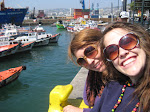


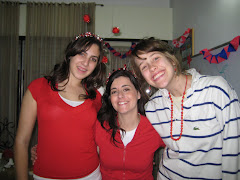
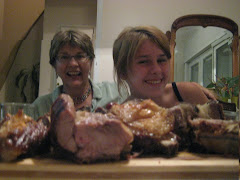
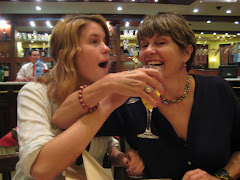
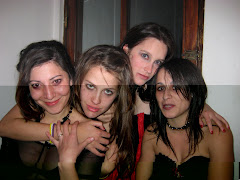



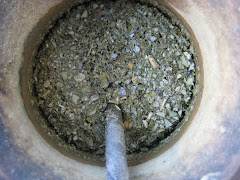
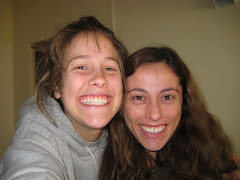



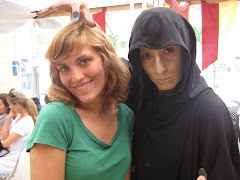
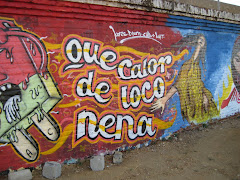











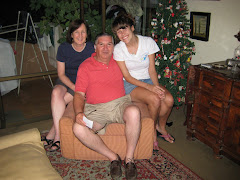
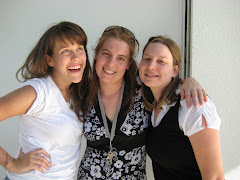+004.jpg)
+003.jpg)
